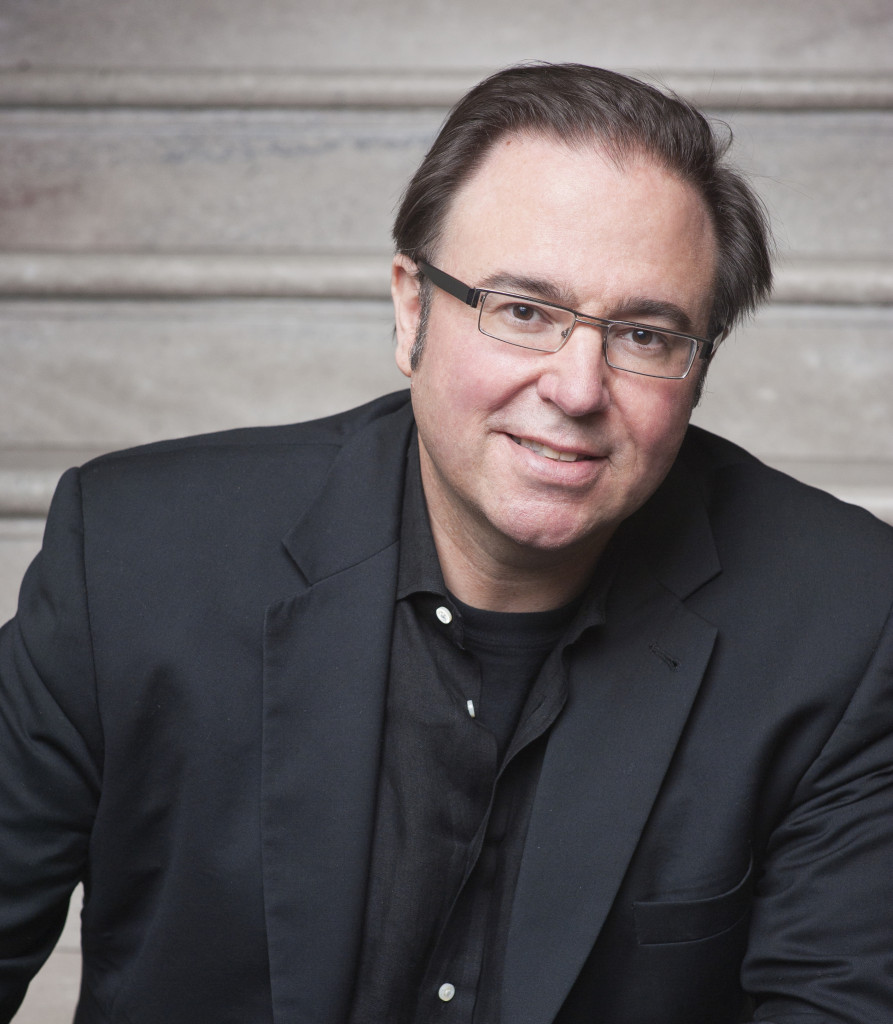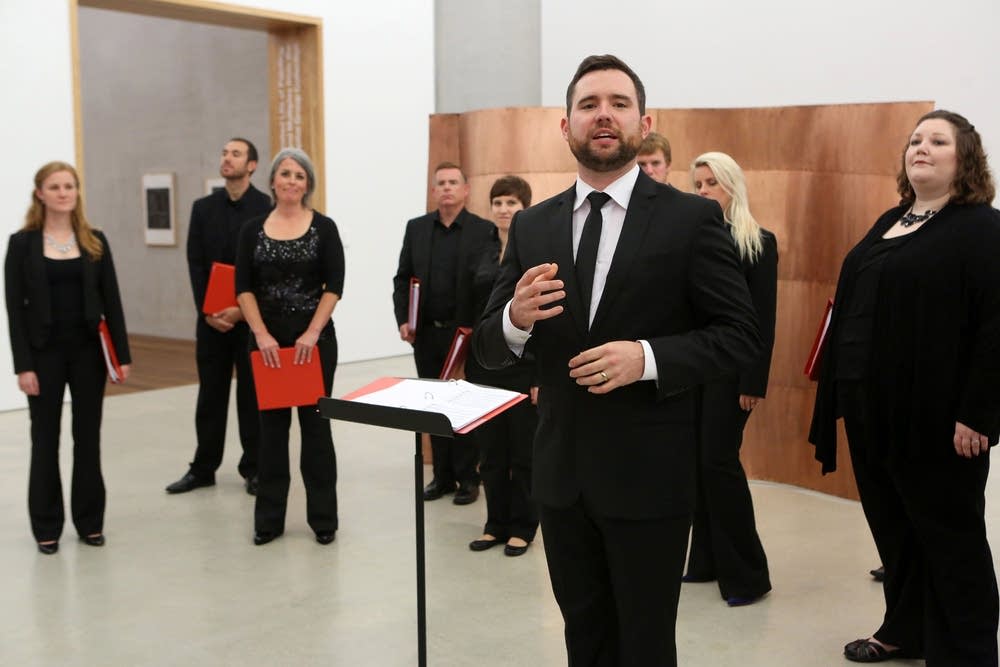
For this, its 15th season, Seraphic Fire is going all-in with contemporary music and at the same time returning to some of the monuments of its past.
The first concert in its series, as presented Oct. 22 at All Saints Episcopal Church in Fort Lauderdale, offered two world premieres, one by the choir’s founder, Patrick Dupré Quigley, and the other by one of the country’s leading composers, Christopher Theofanidis. And the final work on the program featured music by Philip Glass, with contributions from one of the founders of the celebrated new-music ensemble Eighth Blackbird.
So it was a big night for contemporary American music, beginning with Theofanidis’s new Four Levertov Settings, set to four poems by the Anglo-American writer Denise Levertov. Theofanidis, who teaches at Yale, is probably best-known for his 2002 orchestral tone poem, Rainbow Body, and the same kind of directness and embrace of melodic profile was evident in these four settings.
Theofanidis scored the piece for choir and solo violin, played here by Matthew Albert, the Eighth Blackbird co-founder who now heads the chamber music program at the University of Michigan. Albert is a splendid player, with a forceful, commanding sound and plenty of technique. The four poems all evoke music — Bach, Haydn, Bruckner and steel drums — and Theofanidis cannily built his settings on these verbal allusions.
In the third setting, for example, titled “Bruckner,” the music builds to a huge diatonic climax, just as in Bruckner’s symphonies, and in the second, “The Mystery of Deep Candor,” there was a simplicity of style and charm very much like Haydn, to whom the poem refers. Soprano Sarah Moyer was impressively big-voiced in the first setting, “Unaccompanied,” as Albert played a strenuous meditation on a Bach sonata, but the most interesting of the four pieces was the final one, “One December Night…”
Theofanidis gives the violinist largely pizzicato chord outlines, summoning up a distant sound of “harp or lute, but no/I’d say it was steel drums,/played with an airy whispering touch,” as Levertov’s poem says, describing how one night her kitchen was flooded with moonlight. It’s a lovely, sensitive poem, and Theofanidis’s music mirrored it beautifully, following the ebb and flow of the words with a sonic language that leaned on an augmented scale pattern and was decorated with illustrative touches such as high violin harmonics that added mystery to the tale of the poet’s lunar visitor.
The Four Levertov Settings is a skillful and admirably crafted work that should present challenges and real rewards to ensembles that perform it hereafter. It does not have a strong melodic profile, but it summons up atmosphere expertly, and it is to Seraphic Fire’s everlasting credit that it was able to commission this fine piece. Albert and the singers did an impeccable job of bringing this new music to life, and it won warm acclaim from the audience.

Quigley, whose compositional efforts for the choir he founded 15 years ago have been in the realm of new Christmas carol settings, was featured in a world premiere himself, with his Three Ostinati for Voices. This is a much more direct work than the Theofanidis, but also shows a great deal of compositional skill. The three pieces — “Music, when soft voices die,” to familiar words by Shelley; “Regina coeli,” the traditional Catholic Marian hymn; and “There will be rest,” to words by the now largely forgotten American poet Sara Teasdale — each use a different pattern around which Quigley builds his pieces.
The Shelley setting used the word “music” repeated throughout in the female voices, while floating plainspoken melodic fragments, including a chromatic slide, above it. The “Regina coeli” was quite fast, with those two words (Latin for “queen of heaven”) quietly, insistently repeated while the rest of the chorus sang sweeping, climbing figures that also rose in volume. It struck me as slightly too fast for the singers, and a not entirely persuasive setting of the text: here, a straightforward hymn of praise sounded agitated rather than exultant.
The third song, “There will be rest,” used a simple tonic-subdominant chord change in the men’s voices as an ostinato that was sweet and soothing, underpinning a very pretty melody in the women’s voices; it reminded me in overall effect of Franz Biebl’s “Ave Maria,” and at the same time was very much in the same vein as a lot of American contemporary sacred choral music.
Quigley directed his own piece, and it was easy to see the affection his singers have for him as he conducted. They sang beautifully, and Quigley, who at 39 was the youngest composer on the program, has written an impressive work that stood up well among the other pieces, and surely we can look forward to more in the future.
The final work on the program was the Five Knee Plays from Glass’s enormous opera Einstein on the Beach. The plays were the in-between music of the opera’s acts and joined them, hence the coinage “knee plays.” The texts consists only of numbers counted again and again, and solfège syllables, famously because there wasn’t time before the 1977 premiere of this work for anyone to come up with texts that would work.
The music is tedious and boring, but it does work on a large scale because it sets completely different expectations for the audience than the drama of songs or sonata form. Once you accept its nothingness, it opens your ears to the smallest changes in the unchanging sonic wallpaper. Albert, who did remarkable work as the violinist, added a couple very un-Glassian mordents in his part of the final knee play, and it was like a shaft of light had suddenly entered the dark jail into which the audience at All Saints Episcopal had been thrown.
Glass is not so controversial as he once was, and a piece like Einstein on the Beach has reached classic status. But it doesn’t really deserve it. His music is far more effective in movies, such as his masterful score for Koyaanisqatsi, because the sweep of the cinematography fills in the narrative that the music lacks. But judging from the rapturous reception the Knee Plays got from the audience, my opinion is distinctly in the minority.
The choir sang the Glass superbly, and like his mounting of Steve Reich’s Desert Music last season, Quigley has achieved something remarkable by pulling this off. Those two concerts will surely add to Seraphic Fire’s reputation for important music-making, and lift Quigley’s profile in the world of cutting-edge music.
The concert opened with three well-known contemporary pieces, Steven Sametz’s I have had singing, Irving Fine’s Have you seen the white lily grow, and South African composer Peter Klatzow’s Cover me with the night. All three had the vocal sheen and polish South Florida audiences have come to rely on with Seraphic Fire, and provided a most pleasurable way to start the season.
And it was a season that started with a benediction: The very first piece, unlisted, was Samuel Ward and Katherine Lee Bates’s America the Beautiful, which really should be our national anthem. It served as a simple statement of faith in country that we sorely need right now, and the All Saints audience received it gratefully.